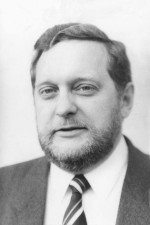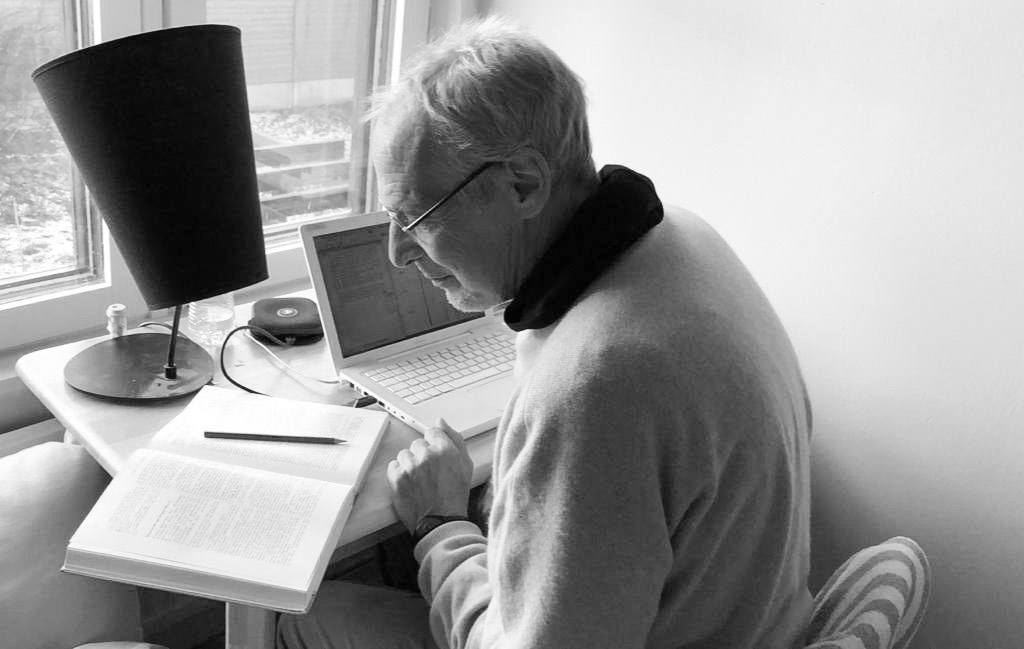In Memoriam
Roger Finch
(April 17, 1937 – October 4, 2019)
Let us all go cultivate our gardens.
(Voltaire, Candide)
Roger Finch was born on April 17, 1937, in Pittsburgh, Pennsylvania, son of Willard and Phyllis (Creek) Finch, and died on October 4, 2019, of cardiac arrest.
Roger Finch graduated from George Washington University with a B.A. majoring in music and Harvard University with a PhD in linguistics. In 1977, after graduating from Harvard he was offered a position in Tokyo, Japan, writing textbooks for Japanese learning English. He started teaching English at Waseda University. and later moved to Sophia University in Tokyo where he taught—besides English—Modern American Poetry and phonology as well as historical and comparative linguistics. Through an introduction by Professor Paul Takei, he accepted a tenured position at Surugadai University near Tokyo in 1990 when he had already been pondering a possible return to the United States, intending to settle at his house in Maine which he had bought a long time ago.
The position at Surugadai University proved to be most fortunate; as he once wrote, he was impressed by the modern, new, attractive and well-equipped premises of the University (which had only been established three years earlier, in 1987). Given his profound love for nature, the trees and the hilly surroundings of the university campus certainly were hugely attractive to him, as he confessed once when resigning from his post. Yet, it was most important to him that he quickly made friends with colleagues, staff members and students alike, developing lasting friendships. Of his students, he spoke in terms of admiration, affectionately praising their polite manners, desire to learn and profound attention. Prior to his return to the United States in 2008, he honoured these bonds developed over two decades by encouraging his friends to visit him in Maine.
After retirement, Roger Finch dedicated his life to the things he loved most: linguistic research, writing poetry, and music composition. He once estimated that the share of his scholarly work would decrease in favour of poetry and music, but nonetheless he continued to contribute substantial, well-researched papers, combining his favourite interests when writing. His papers about subjects as diverse as folk bird taxonomies in Japan (“日本の鳥類の民間分類”, [Nihon no chôrui no minkan bunrui], Surugadai daigaku ronsô, No. 36 (2008), pp. 49–80 (this is the Japanese version of a paper presented at the 49th Annual Meeting of the PIAC in Berlin, 2006), or „Christianity among the Cumans“ Surugadai daigaku ronsô, No. 35 (2008), pp. 75–96, or „The Reconstruction of Proto-Altaic *p-“, Surugadai daigaku ronsô, No. 28 (2004), pp. 69–99, or „Musical Instruments in Uigur Literature and Art“ Surugadai daigaku ronsô, No. 24 (2002), pp. 23–53, to mention just a few papers he published during his tenure at Surugadai University, demonstrate Roger Finch’s encyclopaedic scholarship. It is difficult to say whether his attention to minutiae, combined with a broad scope of diverse interests, as demonstrated in his scholarly work was an inborn personal trait or perhaps was acquired in the scholarly environment in Japan, but one way or the other, his personal mindset and Japan‘s scholarly values complemented each other in a most auspicious and beneficial way.
Over nearly two decades Roger Finch has been a faithful PIAC member, participating at least eight times since 1998, yet the earliest connection can be traced to 1989 when Denis Sinor announced some of Roger Finch‘s recent publications in the PIAC Newsletter. His contribution to the 56th Annual Meeting, Kocaeli 2013, waits to be published.
Roger Finch was also praised for his knowledge and command of Turkish. Let him describe, in his own translation of a prophetical masterpiece of Turkish poetry by Yahya Kemal Beyatli (1884-1958), the last voyage he embarked on:
Silent ship
If there comes a time to raise anchor from time, one day more,
A ship will set out from this harbor toward an unknown shore.
It makes way silently, as though it held no living soul;
At that unrocking parting no hand waves as the lines unroll.
Roger Finch leaves his spouse, Louis Hargan, equally faithfully a PIAC member, and his sisters, to whom I offer my deepest condolences.
Oliver Corff, October 12, 2019.
(Note: Edited the same day: two forgotten words added, and poem properly attributed to Yahya Kemal Beyatli. OC, 2019-10-12, 21:47 CEST/CEDT)


